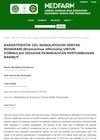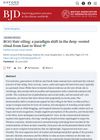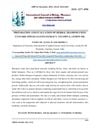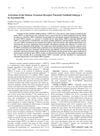 January 2020 in “Asian journal of applied science and technology”
January 2020 in “Asian journal of applied science and technology” Good nutrition is crucial for health and preventing disease, and supplements can help prevent nutrient deficiencies.
 January 2002 in “Journal of Toxicology-cutaneous and Ocular Toxicology”
January 2002 in “Journal of Toxicology-cutaneous and Ocular Toxicology” Botanical extracts are increasingly important in cosmetics and drugs for their effectiveness and safety, backed by traditional use and scientific evidence.
3 citations,
November 2022 in “Molecules/Molecules online/Molecules annual” The substances improved hair regrowth and protected hair cells in humans and mice.
 3 citations,
August 2021 in “The Open Dermatology Journal”
3 citations,
August 2021 in “The Open Dermatology Journal” The herbal hair serum improves hair quality and growth, and is a good alternative to traditional cosmetics because it doesn't contain harmful chemicals like parabens and sulphates.
2 citations,
August 2022 in “Animals” Essential oils may improve dogs' health and melatonin can help with their sleep and anxiety, but both should be used carefully.
 7 citations,
January 2017 in “Clinical and medical investigations”
7 citations,
January 2017 in “Clinical and medical investigations” Suriname uses many plants for beauty, with potential for a beauty industry, but more evidence is needed for product effectiveness.
 1 citations,
March 2023 in “Phytochemistry Reviews”
1 citations,
March 2023 in “Phytochemistry Reviews” CBD may improve skin and hair health, but its effective use and safety need more research.
 April 2024 in “International Journal of Research Publication and Reviews”
April 2024 in “International Journal of Research Publication and Reviews” Alopecia areata causes hair loss with varied treatment responses and frequent relapses.
 November 2015 in “Hair transplant forum international”
November 2015 in “Hair transplant forum international” Rosemary oil might help with male pattern baldness.
2 citations,
January 2016 in “Journal of in silico & in vitro pharmacology” Combining Minoxidil and Rosemary oil in liposomes improves Minoxidil's effectiveness and remains stable for 60 days.
Rosemary essential oil can be used in a stable massage cream, with the oil to water ratio affecting its properties.
1 citations,
February 2015 Rosemary is used for digestion, headaches, stress, memory improvement, hair growth, and aromatherapy.
 June 2024 in “MEDFARM Jurnal Farmasi dan Kesehatan”
June 2024 in “MEDFARM Jurnal Farmasi dan Kesehatan” Rosemary oil nanoliposome gel is effective for promoting hair growth.
January 2008 in “한국미용학회지” Certain enzymes and a growth factor were higher in mice treated with minoxidil or a peppermint and rosemary oil mix, which may be good indicators of hair growth.
December 2007 in “한국미용학회지” Peppermint and rosemary oil mixture promotes hair growth similar to minoxidil and has antibacterial effects.
1 citations,
October 2021 in “International journal of pharmaceutics and drug analysis” The Aloe Vera shampoo worked better for hair care than a regular shampoo.
 June 2024 in “British Journal of Dermatology”
June 2024 in “British Journal of Dermatology” Hair oiling has become popular in the West due to globalization and social media.
February 2014 in “아시안뷰티화장품학술지” Natural extracts like peppermint and rosemary oils are effective for hair growth and scalp health.
 December 2023 in “Medicine and Materials”
December 2023 in “Medicine and Materials” Essential oils are increasingly used in cosmetics for their natural benefits but must be used carefully to avoid skin reactions.
 May 2023 in “Al-Mağallaẗ al-ʻirāqiyyaẗ li-l-ṣaydalaẗ”
May 2023 in “Al-Mağallaẗ al-ʻirāqiyyaẗ li-l-ṣaydalaẗ” High doses of rosemary extract can harm the liver, kidneys, and reproductive organs in young rats.
December 2012 in “한국피부미용향장학회지” Different aroma oils are suited for dry, oily, or sensitive scalps based on their specific chemical compositions.
 23 citations,
March 2019 in “Journal of Essential Oil Research”
23 citations,
March 2019 in “Journal of Essential Oil Research” Rosemary's antioxidant content changes with the climate and season.
 November 2024 in “International Journal of Biology Pharmacy and Allied Sciences”
November 2024 in “International Journal of Biology Pharmacy and Allied Sciences” The herbal shampoo is safe, effective, and may reduce hair loss and promote growth.
22 citations,
September 2013 in “Science international” Leafy spices like basil and mint are very healthy and can help with digestion, hair loss, and inflammation.
 28 citations,
January 2010 in “Biological & pharmaceutical bulletin”
28 citations,
January 2010 in “Biological & pharmaceutical bulletin” Certain essential oils can activate a human skin receptor, potentially helping with skin disorders.
 19 citations,
February 2015 in “Contact dermatitis”
19 citations,
February 2015 in “Contact dermatitis” Avoiding certain fragrances improved the man's skin condition.
 12 citations,
November 2017 in “Archives of Dermatological Research”
12 citations,
November 2017 in “Archives of Dermatological Research” Mediterranean diet with fresh herbs and vegetables lowers male hair loss risk.
 January 2024 in “International Research Journal Of Modernization In Engineering Technology And Science”
January 2024 in “International Research Journal Of Modernization In Engineering Technology And Science” Hair growth serums reduce hair fall and improve growth with mostly positive reviews.
 1 citations,
January 2024 in “Scientific reports (Nature Publishing Group)”
1 citations,
January 2024 in “Scientific reports (Nature Publishing Group)” Human hair was used to make biodegradable plastic films that could be useful for packaging and disposable products.
32 citations,
February 2020 in “PTR. Phytotherapy research/Phytotherapy research” Rosemary extract may boost the immune system, but more research on humans is needed to confirm this.


















